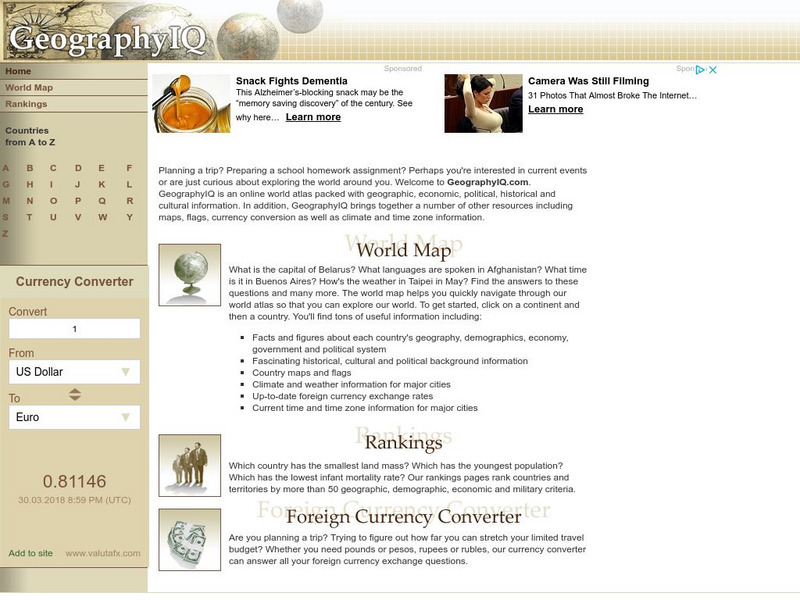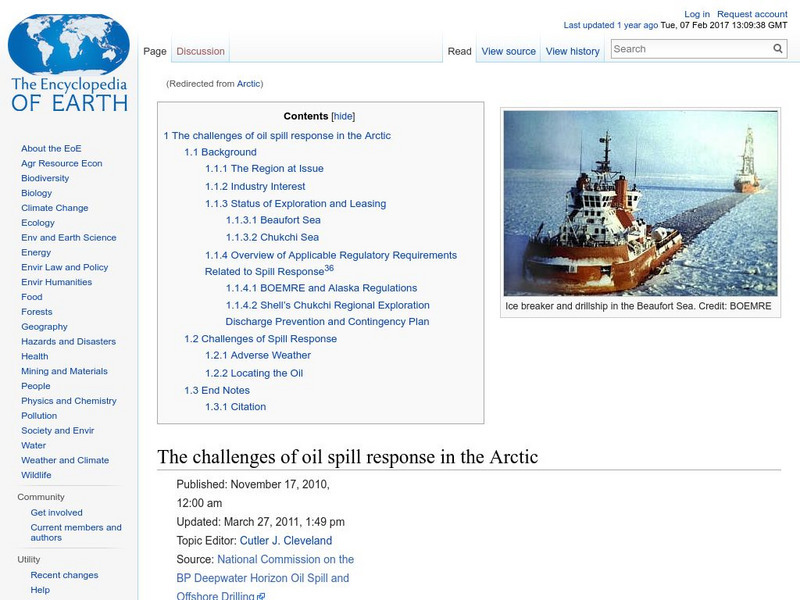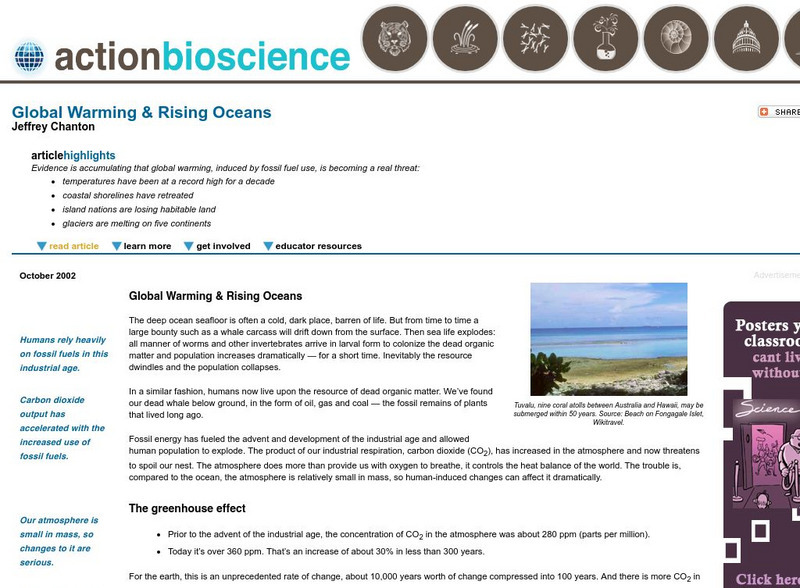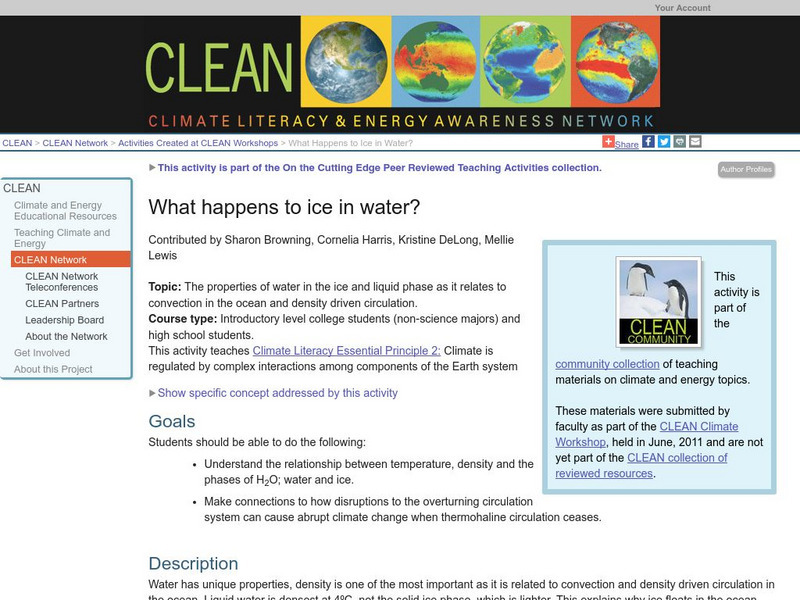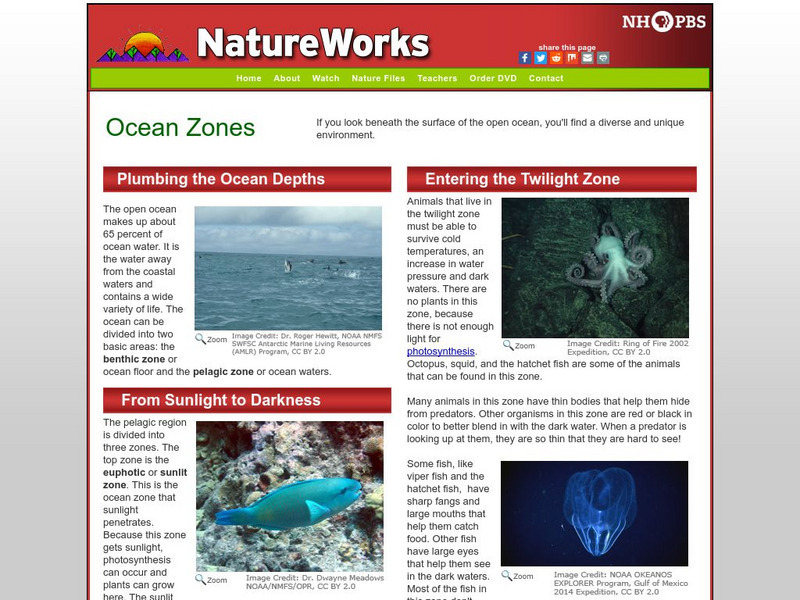Geographyiq
Geography Iq
Detailed geographical information on any country is available at this site. Within the World Map section, you can get facts and figures about each country's geography, demographics, government, political system, flags, historical and...
Encyclopedia of Earth
Encyclopedia of Earth: Arctic Ocean
Lengthy illustrated article about the Arctic Ocean discusses all the many features and characteristics of this vast northern ocean--sea ice, icebergs, ice shelves, ice islands, the Arctic Ocean floor, continental shelf--as well as the...
Other
Climate Central: Surging Seas
An interactive map that shows how areas will be effective by rising sea levels. See the flooding risks down to the neighborhood. Also find statistics of affected populations, homes and lands. There is also factsheets, widgets, and action...
American Institute of Biological Sciences
Action Bioscience: Global Warming & Rising Oceans
Overuse of fossil fuels has exploited the threat of global warming on Earth. This article features the details of the threat and provides additional resources.
Climate Literacy
Clean: What Happens to Ice in Water?
Students investigate the properties of water in the ice and liquid phase as it relates to convection in the ocean and density driven circulation, and ultimately the climate.
Science Struck
Science Struck: Facts About the Marine Biome
Describes the characteristics of the marine biome, the plants and animals that live in each of the four ocean zones, coral reefs and estuaries, the climate of the marine biome, and the marine food web.
National Geographic
National Geographic: Using Models to Make Predictions
Students investigate the interaction between greenhouse gases, solar radiation, and the Earth's surface and oceans for the impact on global warming. By altering variables, they can project what reduction in greenhouses gases is needed in...
University of California
Ucmp: The World's Biomes
This is an introduction to the major biomes on Earth. This page groups biomes into five major types: aquatic, deserts, forests, grasslands, and tundra. Information on climate, animal/plant life, and much more is given for each of type...
National Geographic
National Geographic: Sources, Sinks, and Feedbacks
Students will learn about how the Earth's carbon cycle works, as they examine the relationship between levels of carbon dioxide and water vapor in the atmosphere and the temperature of the ocean's surface. Includes online student...
NASA
Nasa Earth Observatory: Global Maps: Sea Surface Temperature
This global map from NASA's Earth Observatory shows the sea surface temperature from July 2002 to October 2008. Learn the influences that sea surface temperature has on climate and weather.
Exploratorium
Exploratorium: Global Climate Change: Hydrosphere
Use this site to explore real scientific data relating to the hydrosphere. With this information you can gather evidence, test theories, and come to conclusions. Click on the data examples to view a full scale version.
National Center for Ecological Analysis and Synthesis, University of California Santa Barbara
University of California: A Global Map of Human Impacts to Marine Ecosystems
Maps in different categories such as fishing, climate change, and pollution were pulled together into a composite map that shows the impact of humans on the world's oceans. Analysis at the time (2008) showed that 40% of the world's...
NASA
Nasa Earth Observatory: Polar Paradox
In this article about global warming, learn how the warming climate could affect the polar ice caps, glaciers, sea ice, and amount of freshwater entering the polar oceans. Read how some scientists believe global warming could add to...
Other
Allerin: How Green Robots Are Helping With Environmental Sustainability
Robots are now being used to fight climate change and protect our green environments. They help to fight forest fires, manage our waste, restore the oceans, support renewable energy initiatives, and make agriculture more-environmentally...
NOAA
Noaa: Year of the Ocean, Kids and Teachers Corner
Great resources on a variety of ocean and environmental concerns, endangered plants and animals, climate and habitats, frequently asked questions and fact sheets.
Other
Cape Farewell Arctic Voyage
Cape Farewell is an organization dedicated to the study of the ocean's role in regulating global temperature and its relationship to climate change and global warming. Each year a trek is made in order to study these climate changes....
Discovery Education
Discovery Education: Curriculum Center: Science
The Discovery Channel provides numerous topics that are the most popular science topics taught in upper elementary and middle school. Content is organized by topics (Bacteria, Oceans, Solar System, etc.); all topics include quick facts,...
University Corporation for Atmospheric Research
Ucar: El Nino Southern Oscillation
Learn how the El Nino-Southern Oscillation (ENSO) climate fluctuation affects weather around the world.
Society for Science and the Public
Science News for Students: Sea Changes
Discusses the serious impact greenhouse gases are having on the pH balance of the oceans. It looks at the sea butterfly, which has more difficulty forming a shell as ocean acidification increases, as well as the damage acidification does...
PBS
Pbs Learning Media: What Causes the Gulf Stream?
This video segment adapted from NOVA uses satellite imagery to illustrate the Gulf Stream's path and animations to explain how atmospheric phenomena cause it to move. [1:51]
PBS
Nh Pbs: Nature Works: Ocean Zones
Discover more about the underocean environment at this site that surveys animals, environmental factors such as light and temperature, currents, animals, plants, and the like.
Other
Italyguide: Environmental Settings
This Italian "Environmental Settings" site contains information about the Geological Substratum of Italy, Landforms of Italy, the Alps, the Po-Venetian Plain, the Apennines, the islands, the coastline, Climatic Conditions, Inland Waters,...
Australian Broadcasting Corporation
Australian Broadcasting Corporation: News in Science: Churning Sea Surprises Ocean Watchers
From ABC News in Science, this article examines the role that ocean currents play in global warming and climate issues. The article covers the impact of the Antarctic circumpolar current and its affect on surrounding oceans.
PBS
Pbs: Nature: The Fascinating World of Jellies
Learn about the mysterious jellyfish blooms that have occurred in the world's oceans. Because the resulting alteration to the marine food web has had devastating effects, researchers grow and study jellyfish at the Monterey aquarium....


